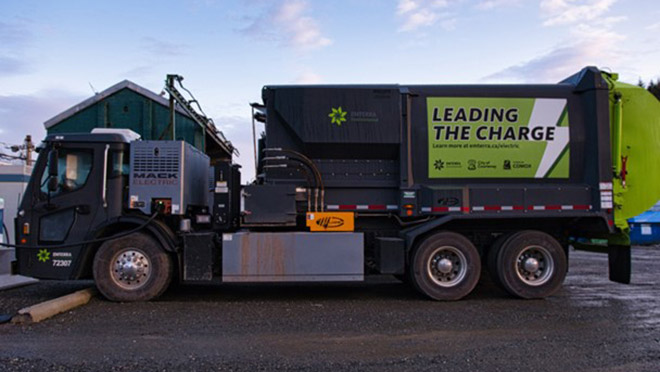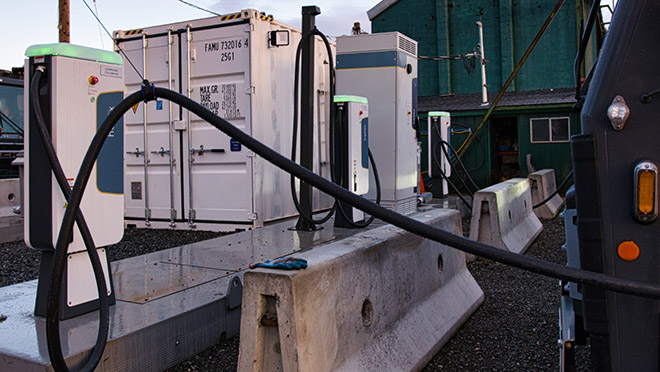 Mack Electric collection trucks are now in service in B.C.’s Comox Valley and can charge to full in 90 minutes on a 150 kilowatt charger.
Mack Electric collection trucks are now in service in B.C.’s Comox Valley and can charge to full in 90 minutes on a 150 kilowatt charger.
"You can hear yourself think": Drivers, community warm to Mack LR Electrics
Part of a series on BC Hydro Clean Energy Champions: businesses, homes, and institutions – large and small – recognized for reducing their reliance on fossil fuels.
The presence of electric collection trucks in B.C.'s Comox Valley may seem surprising to some, but it's a natural progression for the company that has replaced part of its diesel truck fleet in the valley with zero-emission vehicles.
Emterra Environmental founder Emmie Leung has been a sustainability innovator since the 1970s, when she introduced paper recycling to B.C.'s Lower Mainland.
"She was literally going around Vancouver picking up newspaper from back alleys," says her daughter Paulina Leung, now chief sustainability officer at Emterra. "She would leave a flyer at houses or businesses asking people to leave their newspapers and cardboard out for pickup."
In the beginning, Emmie Leung was a one-woman company collecting paper in a panel van in Vancouver. She founded the original recycling company, International Paper Industries, in 1976, eventually expanding its waste management operations to six divisions, and into three additional provinces plus Michigan as the 1,100-employee Emterra Group.
Emterra Environmental now runs nine Mack LR electric garbage trucks: one in Peel Region, Ontario, and eight in the Comox Valley. With a range of over 100 km and the ability to charge to full in 90 minutes on a 150 kilowatt (kW) charger, the trucks are winning over drivers and the public alike. They're also reducing carbon emissions related to three-stream collection pickup in the Comox Valley by approximately 480 tonnes annually – the equivalent of taking 104 cars off the road.
"You'd be hard-pressed to find one of our drivers who wants to go back to driving a diesel truck," says Dave Ross, Emterra's Comox Valley operations manager. "They like the peace and quiet. When you're doing curbside collection in neighbourhoods you can actually hear yourself think, and on a nice day you can roll your window down to enjoy the sounds of nature."
Launching an electric fleet of heavy-duty trucks supports the objectives of the CleanBC Program, which aims to reduce climate-changing emissions by 40% by 2030. Transportation accounts for about 40% of annual greenhouse gas (GHG) emissions in British Columbia. Emterra Environmental's transition to an EV fleet also helps the City of Courtenay and Town of Comox in achieving their net-zero goals for GHG emissions.
"Our commitment to environmental sustainability and climate action is not a choice. It's a necessity," Emterra founder Emmie Leung told the Comox Valley Record. "We are thrilled to lead the charge in deploying electrified transportation technology in British Columbia. This is a monumental moment for Emterra Environmental and for the waste management industry in Canada."
"I don't see this kind of support in other provinces"
When Emterra next converts more of its waste collection fleets to electric, it will likely happen in B.C.
Paulina Leung says that after first running a one-electric-truck pilot program in Ontario, Emterra chose the Comox Valley for a full fleet conversion based on a combination of the funding and expertise available in B.C. Emterra leaned on federal, CleanBC and BC Hydro funding help to make the business case in the Comox Valley.
"It was only because of the three levels of support that we could make this happen," says Leung. "I don't see this kind of support in other provinces."
BC Hydro offers up to 50% funding through a EV Ready fleet plan rebate, along with another up-to-50% electrical infrastructure incentive to help offset the cost of installing the charging infrastructure. Emterra worked with BC Hydro to install six EV fast chargers at the site of their Cumberland material recovery facility.
The Cumberland site is one of six Emterra single-stream material recovery facilities – everything goes into one bin, with no need for sorting, separating or bagging – across Canada. It serves as a regional recycling plant that also takes in recyclables from commercial businesses and other waste management haulers.
"We spent a lot of time working with BC Hydro to understand what our round-the-clock power requirements would be at the Cumberland site," says Leung. "We already have a recycling plant at that location, so when you add the electric vehicles, we needed to know if the infrastructure could support it or if electrical upgrades were needed."
"We wanted to try to avoid those upgrades, which are costly to BC Hydro and costly to us. So we installed some software in our [charging] station to help us even out the demand and prevent or mitigate the need for an infrastructure upgrade."
Emterra has completed a BC Hydro-supported integrated feasibility study on energy storage for backup power at the Cumberland site, and is also looking at fleet electrification in the Lower Mainland.
 Mack Electric truck plugs into one of six fast chargers at Emterra Environmental’s headquarters in Cumberland.
Mack Electric truck plugs into one of six fast chargers at Emterra Environmental’s headquarters in Cumberland.
New routes and regenerative braking: electric trucks in the Comox Valley
Emterra used a few lessons from the single-truck pilot it's running in Peel Region to ensure things would go relatively smoothly in the Comox Valley.
One was to ensure drivers understood how to use regenerative braking to help recharge the trucks' batteries on stop-and-go routes through neighbourhoods. As not all the Mack trucks arrived in Cumberland at once, drivers had a chance to familiarize themselves with the difference between Mack's diesel and electric trucks.
Operations manager Dave Ross said drivers had to wait their turn to drive the new trucks as shipment of the Mack electrics was staggered over a few months. In what was temporarily a combined fleet of diesels and electrics, the drivers all wanted to just drive the electrics. He says the older drivers in particular like the lower cab design that makes entry to the cab easier, and the lack of diesel-engine vibration takes less of a toll on the body over the course of a shift.
The electric trucks are also equipped with automated mechanical arms – which grab any one of the three carts (organics, garbage or recycle) to be tipped into the truck – so drivers do not have to get out of the truck at every stop.
Charging the trucks is largely done after electricity-intensive operations at the Cumberland recycling plant – such as conveyor belts and balers – shut down each afternoon.
"The [recycling plant] operation runs basically from 8 a.m to about 4 p.m. or 4:30 p.m.," says Ross. "When the plant shuts down, the charging system is initiated. So the trucks plug in after our drivers return from their routes, and they're charged after hours through the evening. When the drivers return in the morning, they just unplug the truck and they're ready to rock and roll off site around 7 a.m."